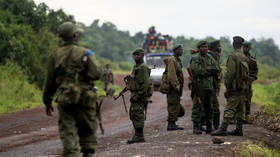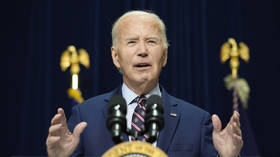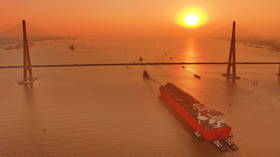Uranium games in Niger and the US-Franco competition

The West has actively been making multidimensional inroads into Africa over the past decade, largely of a malignant nature. The US and its NATO allies are interested in market potential, energy prospects, and military engagement.
The West has lately been focusing on the latter, as seen by the recent Libyan and Malian escapades, and the military maneuverings centered around Boko Haram are but the most recent chapter in the ongoing Western militarization of Africa (aimed against China).
France has been de-facto appointed as the US’ “lead from behind partner” in this region, but the relationship between the two NATO allies is not as secure as it initially seems. Through the overlap of security responsibilities in uranium-rich Niger, the US is positioning itself for long-term control of the uranium mines that help drive France’s economy.
Ever since the 2011 NATO War in Libya (with active French participation), the US has been pursuing the lead from behind strategy that sees“discreet US military assistance with [others] doing the trumpeting”. France’s lead in the Malian War proved its commitment to being the American bulldog in North and West Africa. As further confirmation of this de-facto leadership, France convened a gathering of West African leaders (all former French colonies, with the exception of Nigeria) in Paris last month to discuss the Boko Haram kidnappings and regional military cooperation. Quite clearly, France is taking the lead in West Africa while the US supervises from behind.
There are a few reasons why France has so actively played the bulldog for America’s strategy in the region. Firstly, prestige is very important to the French psyche, and this has historically been something which the country has always struggled with, and been overly sensitive about. Since Sarkozy, the French authorities have been intent on promoting French civilization in the Francophone world as a means of projecting global influence. Additionally, economic and energy motivations are at play as well. Africa is projected to be the continent with the highest rate of economic growth, so it is important for the French economy to gain preferential access there. This is especially so since Nigeria has just surpassed South Africa as the continent’s largest economy. The EU also has designs on building a gas pipeline from the country to serve as an alternative to Russian supplies.

France’s strategic focus, however, is on Niger. Not only would the aforementioned pipeline have to pass through the country en route to the EU (giving whoever can leverage control over its territory “Ukrainian Status” over the resource flow), but it is also extremely rich in uranium. It is the world’s fourth largest producer and contributes 7.5% of global output; with the French nuclear power company Areva having control over its two primary mines. 75% of French electricity is generated by nuclear power, with 40% of it coming from Niger. It also has a military base and Special Forces deployed there as part of a larger Sahel-wide strategy. France thus has a strategic interest in Niger that it is willing to defend.
Unfortunately for France, this interest can also serve as vulnerability since Niger is one of the least stable places on Earth. Its population is expected to quadruple by 2050, and being so quintessentially impoverished it will be nearly impossible for the government to provide for this massive increase of citizens. Malian-based terrorists have already been active in the country, and Niger served as a transit route for heavily-armed militants traveling from Libya to Mali to fight. In fact, the country is basically one large crossroads of terrorist and non-state actor activity linking together Mali, Libya, and Nigeria’s Boko Haram. It could possibly even surpass Libya as the “Scumbag Woodstock”http://news.yahoo.com/libya-now-terrorist-woodstock-094500016--politics.html sometime in the near future.
The above concerns and uranium significance cue in American military involvement in Niger. Last year the US sent 100 troops there to build and operate a drone base for use against the militants traversing the country and staged nearby. Just last month, the US announced that it will also be training so-called elite counterterrorism units in Libya, Mali, Mauritania, and Niger. While the US is delegating a large share of military responsibility to France in the region, it is still directly involving itself in specific matters that it deems of critical importance. Niger is arguably a tinderbox of terror, but it is also exceptionally important for France’s strategic energy needs. Hegemonic influence over Niger would indirectly lead to substantial control over France’s uranium dependency, thereby allowing Washington to leverage influence over Paris.
The dual terrorism-energy motivation of US military involvement in Niger becomes more apparent when one is reminded of the 2013 coup in Mali. This was carried out by an elite serviceman who was trained in the US, raising the specter that the same could be once more enacted in other countries where the US is training elite “anti-terror” cadres. Given its history of carrying out coup d’états worldwide, it is not a far step to venture that the US would activate yet another unconstitutional overthrow of power if it felt that this would empower and advance its interests in one way or another. Quite possibly, if France attempted to return to its Gaullist roots of sovereignty protection, the US may initiate a Nigerien destabilization operation to interfere with France’s uranium dependency there.
Altogether, the US and France are closely cooperating in the NATO militarization of Africa during the “Second Scramble”. Despite being somewhat different in their approaches, they represent “two hands from the same magician” working behind the scenes to advance the Western interest there. Concurrently, as can be seen by the NSA spying directed against European “allies”, Washington does not place full trust in those that it cooperates with. Therefore, it is fully in line with America’s established track record of deceit to hedge itself towards a position of guiding influence over its partners, specifically France. In the event that Paris’ ambitions for power get the best of it and it once more “goes rogue” from Atlantic command, the US will play the Nigerien uranium card to enact maximum pressure on the country and force it back into the unipolar fold.
Andrew Korybko for RT
The statements, views and opinions expressed in this column are solely those of the author and do not necessarily represent those of RT.
The statements, views and opinions expressed in this column are solely those of the author and do not necessarily represent those of RT.












